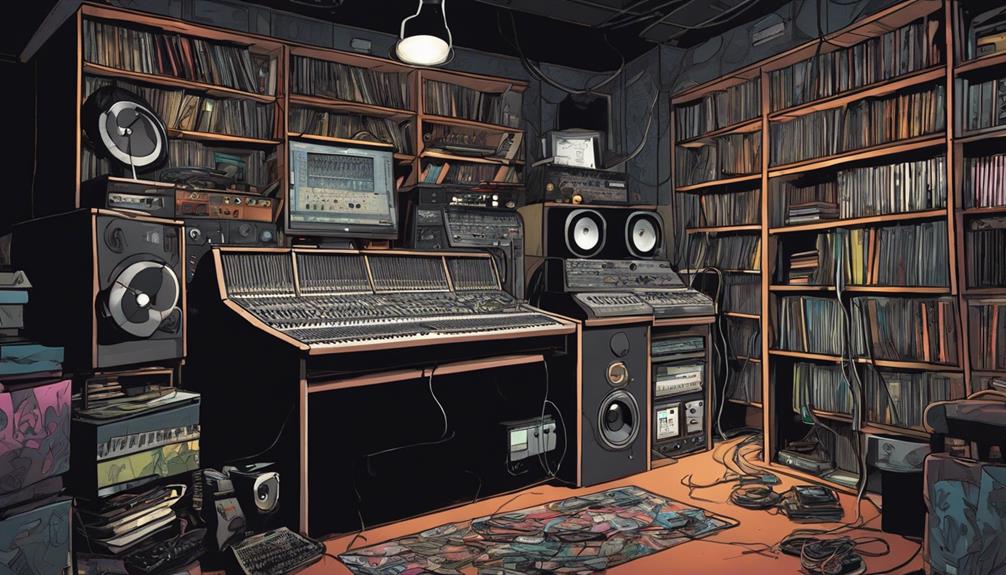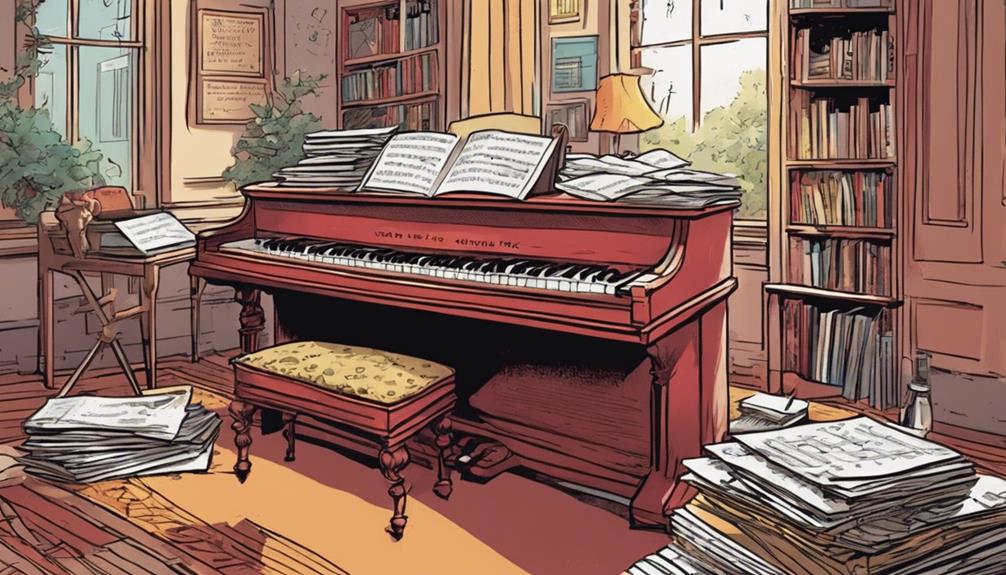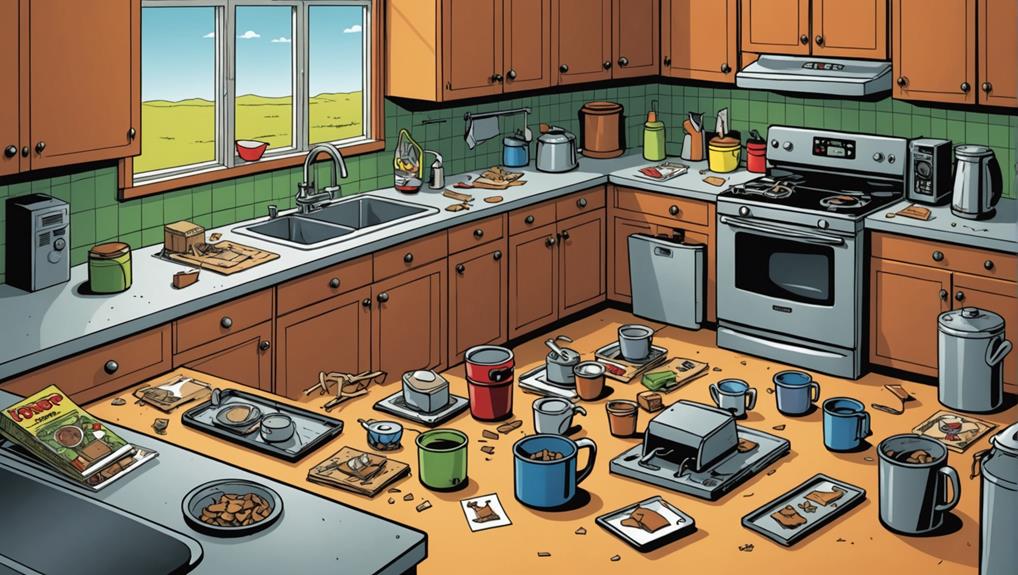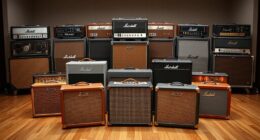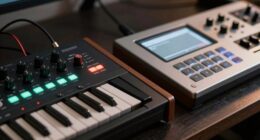When it comes to leveling up my sound in music production, I know having the right resources can make all the difference. That's why I turn to industry-recommended books for valuable insights, practical tips, and expert guidance. For electronic music producers, 'Music Habits: The Mental Game of Electronic Music Production' offers practical insights on music production, motivation, and mental habits. For instrument-specific guidance, 'Ghibli Best Stories: Original Edition' and 'Universal Method for Saxophone' provide challenging yet enjoyable pieces and advanced playing techniques. To advance my skills, I rely on 'Music Production: Advanced Guide for Music Producers' and 'The Study of Fugue' for in-depth coverage and historical analysis. Want to know more about the best books on music production? These selections barely scratch the surface of what’s available, as the best books for music production cater to every skill level and genre. Whether you’re diving into sound design, mixing, or mastering, there’s always a book out there to deepen your knowledge and refine your craft. Exploring these resources not only enhances technical skills but also fuels creativity, helping you produce tracks that truly stand out.
Key Takeaways
- Look for authors with hands-on experience in music production, offering valuable tips and real-world examples.
- Industry veterans provide in-depth knowledge, trends, and professional advice, highlighting networking opportunities and career guidance.
- Educational background and certifications validate an author's expertise, demonstrating skills and industry recognition.
- Books covering music production topics, such as motivation, workflow, and organization, can improve overall production quality.
- Comprehensive guides and advanced resources can help music producers advance their skills and stay up-to-date with industry standards.
Music Habits: The Mental Game of Electronic Music Production

Whether you're a seasoned producer or just starting out, 'Music Habits: The Mental Game of Electronic Music Production' is the perfect choice for anyone looking to tap into their full creative potential and overcome the mental barriers that hold them back from producing high-quality electronic music.
This book doesn't just focus on music theory or technical training, although it's true that knowing music theory can enhance your skills and speed up your learning process. Instead, it explores the mental game of music production, helping you form new habits and replace bad ones.
The author's approach is practical and easy to read, offering valuable insights into various aspects of music production, motivation, and mental habits. By applying the principles outlined in this book, I've seen improvements in my workflow, work ethic, and organization, and I'm not alone – many readers have reported similar benefits, even becoming mentors for fellow producers.
Best For: Electronic music producers of all levels, from beginners to seasoned professionals, looking to improve their creative potential and overcome mental barriers in music production.
Pros:
- Offers practical and easy-to-read insights into music production, motivation, and mental habits
- Helps readers form new habits and replace bad ones, leading to improved workflow, work ethic, and organization
- Relevant to current-day technology and musical styles, making it a valuable resource for electronic music producers
Cons:
- May not provide in-depth music theory or technical training for those who need it
- Some readers may find the focus on mental habits and motivation not applicable to their specific needs
- No specific cons mentioned in the provided text, so these points are speculative
Ghibli Best Stories: Original Edition

As an intermediate piano student, I find the Ghibli Best Stories: Original Edition to be the perfect choice, offering beautiful music true to the composer, with challenging yet enjoyable pieces that aren't dumbed down or simplified.
This book includes multiple songs from various Studio Ghibli films arranged for piano, featuring compositions from films like Spirited Away, My Neighbor Totoro, and Howl's Moving Castle, all approved by the composer, Joe Hisaishi.
The pieces are of different levels, offering a variety for players, and the book is well-made with beautiful paper, making it a great addition to any music library.
With its high-quality arrangements and diverse selection of songs, I highly recommend the Ghibli Best Stories: Original Edition to any intermediate piano student looking to level up their sound.
Best For: Intermediate piano students looking for a challenging and enjoyable playing experience.
Pros:
- The book features beautiful music true to the composer, with challenging yet enjoyable pieces that are not dumbed down or simplified.
- The book is well-made with beautiful paper, making it a great addition to any music library.
- The compositions by Joe Hisaishi offer a variety of levels, suitable for early advanced players who can figure out fingering.
Cons:
- Some reviewers wish for a hardback or spiral binding option.
- There is a mention of a dent in one reviewer's product, indicating potential quality control issues.
- The book is not hardcover, which may be a drawback for some users.
Universal Method for Saxophone (Dover Books On Music: Instruction)

For saxophonists seeking a thorough and trusted training method, the Universal Method for Saxophone stands out as a valuable resource, covering a wide range of topics from instrument components to advanced playing techniques.
This extensive guide, often referred to as the 'Saxophone Bible,' has been a staple in saxophone education since 1908. Its well-organized structure takes learners on a journey from the basics to advanced concepts, making it suitable for saxophonists of all levels.
The book's exercises, which include scales, intervals, and musical passages, help improve tone production, fingering, and breath control. While some users find it overwhelming without proper guidance, many instructors recommend it as a valuable resource.
With its durability and ease of use, the spiral-bound version is a popular choice among saxophonists.
Best For: Saxophonists of all levels, from beginners to experienced performers, seeking a comprehensive and trusted training method.
Pros:
- Covers a wide range of topics, including instrument components, reed-making, tuning, tone production, fingering, breath control, and playing techniques.
- Includes exercises for scales, intervals, notes, arpeggios, cadenzas, and various musical passages, as well as solos and duets by classical composers.
- Recommended by instructors and considered a valuable resource for saxophonists.
Cons:
- May be overwhelming for beginners without proper guidance.
- Some editions lack a saxophone fingering chart, which is essential for beginners.
- Lacking in modern musical notation and appeal, but still useful when used alongside other resources.
Music Production: Advanced Guide for Music Producers

For producers seeking to take their skills to the next level, the 'Music Production: Advanced Guide for Music Producers' is the ultimate resource, offering a wealth of technical, practical, and thorough knowledge to elevate their music production skills.
This advanced guide covers a wide range of topics, including setting up a professional music studio, optimizing your computer setup, and mastering audio recording, mixing, and sound design techniques.
What I find particularly inspiring is the success story of a 19-year-old producer who achieved success in the industry, proving that with the right skills and knowledge, anything is possible.
While some critics argue that the book lacks depth and original insights, I believe it provides an in-depth coverage of music production topics that are relevant to the global music industry.
Best For: Music producers seeking to advance their skills and knowledge in music production, particularly those in the early stages of their career.
Pros:
- Provides a comprehensive coverage of music production topics, including setting up a professional studio, optimizing computer setup, and mastering audio recording, mixing, and sound design techniques.
- Offers inspiring success stories, such as the 19-year-old producer who achieved success in the industry, motivating readers to strive for excellence.
- Covers relevant topics for the global music industry, making it a valuable resource for music producers worldwide.
Cons:
- Criticized for lacking depth and original insights, which may not provide new perspectives for experienced producers.
- May not be suitable for beginners, as some critics suggest alternative books for those in the early stages of music production.
- Does not address the common struggles faced by producers, which may limit its effectiveness in helping producers overcome challenges.
The Study of Fugue (Dover Books On Music: Analysis)

I find 'The Study of Fugue' to be the best choice for composers and music students seeking a thorough historical survey of writings on fugue, covering its origins to modern times.
This all-encompassing book provides a detailed analysis of classical presentations by notable composers like J. J. Fux, F. W. Marpurg, Padre Martini, and J. A. Albrechtsberger, including translations of texts, introductions, critical commentary, and musical examples.
By exploring these historical texts, readers gain insights into different techniques and approaches to composing fugues. The book also offers practical suggestions and techniques on composing a fugue, emphasizing that understanding fugue is more about artistic expression and music skill rather than simply following techniques.
As a result, 'The Study of Fugue' is considered one of the best resources for studying fugue composition and analysis, making it an essential read for aspiring composers.
Best For: Composers, music students, and enthusiasts seeking a comprehensive understanding of fugue composition and analysis.
Pros:
- Provides a thorough historical survey of writings on fugue from its origins to modern times
- Offers practical suggestions and techniques on composing a fugue, emphasizing artistic expression and music skill
- Considered one of the best resources for studying fugue composition and analysis, making it an essential read for aspiring composers
Cons:
- None mentioned in the reviews and feedback
Play It Classical Music: Learn Awesome Music on Piano or Keyboard

When seeking an engaging and intuitive introduction to music production for young learners, the 'Play It Classical Music' book stands out as an excellent choice, leveraging color-coded notes and a primer on reading sheet music to make learning fun and accessible.
As a beginner, I appreciate how this book uses character icons and stickers to correlate with colors, making it easy to start playing immediately. The book's well-constructed design and sturdy materials also guarantee it can withstand repeated use by young children.
With popular classical songs like Ode to Joy and Lullaby, this book provides a solid foundation for beginners aged 5 and up. Although some customers have noted inconsistencies in the color-coding system, the overall feedback is overwhelmingly positive, with parents and learners praising the book's effectiveness in teaching music to beginners.
Best For: This book is ideal for beginners aged 5 and up, including young children and adult learners, who want to learn classical music on the piano or keyboard in a fun and intuitive way.
Pros:
- The book uses a unique and effective color-coded note system that makes learning music fun and accessible for beginners.
- The book is well-constructed and durable, making it suitable for repeated use by young children.
- The book's simplicity and effectiveness in teaching music to beginners have received overwhelmingly positive feedback from parents and learners.
Cons:
- Some customers have noted inconsistencies in the color-coding system for different notes.
- The book's layout may not be as engaging for adult learners who have used other books in the series.
- The book may not be suitable for advanced learners who require more complex and challenging material.
Step By Step Mixing: How to Create Great Mixes Using Only 5 Plug-ins

If you're a music producer seeking to elevate your mixing skills without breaking the bank or getting overwhelmed by a multitude of plug-ins, 'Step By Step Mixing: How to Create Great Mixes Using Only 5 Plug-ins' is the perfect guide for you. This book is designed for those already familiar with mixing music but looking to improve their skills, and it's not suitable for complete beginners or professionals seeking advanced techniques.
The author, Björgvin Benediktsson, takes a no-nonsense approach to mixing, focusing on using only five essential plug-ins – EQ, Compression, Reverb, Delay, and Saturation – to achieve professional-sounding mixes.
The book's content is concise, practical, and easy to understand, making it a valuable resource for beginners and those with some mixing experience. Each chapter covers plug-in theory, practical solutions for common mixing problems, and tips for making mixes stand out.
The book's step-by-step mixing process has helped many musicians achieve better mixes in their home studios, and it's praised for its clarity and simplicity. Whether you're struggling with mixing instruments or seeking clear instructions to elevate your mixes, 'Step By Step Mixing' is a must-have resource for music producers.
Best For: Music producers already familiar with mixing music but seeking to improve their skills, particularly those struggling with mixing instruments, EQ, compression, reverb, delay, and saturation in their home studios.
Pros:
- Concise, practical, and easy to understand, making it a valuable resource for beginners and those with some mixing experience.
- Focuses on using only 5 essential plug-ins to achieve professional-sounding mixes, simplifying the mixing process.
- Offers a step-by-step mixing process that has helped many musicians achieve better mixes in their home studios.
Cons:
- Not suitable for complete beginners or professionals looking for advanced techniques.
- Some reviewers were dissatisfied with the narrator's voice and style in the audio version.
- May not provide enough information for those seeking advanced mixing techniques.
What Can I Play on Sunday? Piano Arrangements

As a church pianist, I find the 'What Can I Play on Sunday? Complete Collection' to be an essential resource, offering a wide range of easily prepared piano arrangements for services throughout the year.
This all-inclusive compilation includes 60 arrangements suitable for various occasions, from traditional hymns to seasonal selections. I appreciate the late intermediate level of difficulty, which provides a good balance between challenge and playability. The book's organization by months and convenient comb binding make it easy to use, even with limited rehearsal time.
I've found the arrangements to be well-crafted and pleasant sounding, with many users praising the quality and variety of the pieces. While some users mention the need for more practice to perfect the pieces, I believe the book is a valuable resource for church pianists looking for suitable pieces for services and special occasions.
Overall, I highly recommend 'What Can I Play on Sunday? Complete Collection' for its practicality, usability, and musicality.
Best For: Church pianists looking for a comprehensive resource of easily prepared piano arrangements for services throughout the year.
Pros:
- Offers a wide range of 60 piano arrangements suitable for various occasions, including traditional hymns and seasonal selections.
- Late intermediate level of difficulty provides a good balance between challenge and playability.
- Well-crafted and pleasant sounding arrangements with a convenient organization by months and comb binding for easy use.
Cons:
- May require more practice to perfect some of the pieces, especially for pianists with limited rehearsal time.
- Some users may find the arrangements too challenging or advanced.
- Limited flexibility in terms of adapting the arrangements to fit specific musical styles or preferences.
First 50 Popular Songs You Should Play On Piano

For early intermediate piano players seeking to build confidence and expand their repertoire, the 'First 50 Popular Songs You Should Play On Piano' book is an ideal choice, offering a diverse selection of simplified arrangements of popular hits and timeless classics.
As I explored this book, I found that it's perfect for those who've learned the basics and are looking to take their skills to the next level. The arrangements are easy to follow, yet still engaging and fun to play.
I appreciated the variety of songs included, ranging from pop hits like 'Candle in the Wind' and 'Hotel California' to jazz standards like 'Autumn Leaves'. The large print format and inclusion of lyrics make it easy to read and follow along.
Overall, I think this book is a great resource for adult beginners and those looking to progress beyond beginner-level playing.
Best For: Early intermediate piano players seeking to build confidence and expand their repertoire, including adult beginners and those looking to progress beyond beginner-level playing.
Pros:
- The book offers a diverse selection of simplified arrangements of popular hits and timeless classics.
- The arrangements are easy to follow, yet still engaging and fun to play.
- The large print format and inclusion of lyrics make it easy to read and follow along.
Cons:
- Some users found the arrangements to be too simple or not challenging enough.
- There are mixed opinions on song recognition and complexity of arrangements.
- Some users may find the book not suitable for their skill level or musical preferences.
Traditional Harmony Book 1

With its emphasis on exercises over rules, Traditional Harmony Book 1 is an ideal choice for music students and professionals seeking a hands-on approach to learning harmony, particularly those already familiar with basic music theory. This book by Paul Hindemith provides a wealth of exercises that guide readers through classical harmony, exploring various possibilities and helping them develop their skills.
What sets it apart from other harmony books is its focus on practical application rather than theoretical explanations. While some may find the lack of thorough explanations and definitions a drawback, the book's structured exercises are praised for their effectiveness in learning.
Overall, Traditional Harmony Book 1 is a valuable resource for those willing to put in the effort to master harmony.
Best For: Music students and professionals seeking a hands-on approach to learning harmony, particularly those already familiar with basic music theory.
Pros:
- Emphasizes practical exercises over theoretical explanations, making it an effective learning tool
- Provides a wealth of exercises that guide readers through classical harmony, exploring various possibilities
- Structured exercises are praised for their effectiveness in learning harmony
Cons:
- Lacks thorough explanations and definitions, which may create misunderstandings for some students
- May be challenging for those who are not patient or hardworking, as it requires a significant amount of effort to master
- Organization and explanations may be unclear, leading to frustration for some readers
Accent on Achievement, Bk 2: Flute, Book & Online Audio/Software

If you're a flute student looking to expand your skills, Accent on Achievement, Bk 2: Flute, Book & Online Audio/Software is an excellent choice, thanks to its thorough review cycle and diverse repertoire of classics and world music.
I was impressed with the fast shipping and packaging of this book, which arrived in near-new condition. My daughter, who's in 6th-grade band, loves using it to learn and grow as a flutist. Her flute teacher also recommends it, and my son has excelled with it.
The book's all-encompassing approach, including rhythm exercises, scale exercises, and full band arrangements, makes it an invaluable resource for any flute student. Plus, it meets and exceeds USA National Standards for music education, so you can trust its quality.
Best For: Flute students in 6th-grade band or those looking to expand their skills with a comprehensive and well-structured method book.
Pros:
- Fast shipping and well-packaged delivery
- Comprehensive review cycle and diverse repertoire of classics and world music
- Meets and exceeds USA National Standards for music education, ensuring high-quality instruction
Cons:
- Not the top favorite method book series for some users
- The CD included may not be used by all students
- May not be as engaging for some students who prefer more interactive or modern materials
Music Production: The Advanced Guide on How to Produce for Music Producers

As a home-based musician, I can attest that 'Music Production: The Advanced Guide on How to Produce for Music Producers' is the best choice for those seeking to produce a track from scratch and discover professional singer-songwriter secrets. This detailed guide covers a wide range of key concepts, from EQ, compressor, reverb, and delay to creating chord progressions and catchy melodies.
It also provides valuable insights on mixing, mastering, and sound design techniques. While some readers have criticized the book's editing issues and lack of organization, I found the content to be valuable and easy to follow, making it suitable for both pros and semi-pros.
With its emphasis on drive and mindset, this book is a great resource for anyone looking to improve their music production skills.
Best For: Home-based musicians, both pros and semi-pros, seeking to produce a track from scratch and improve their music production skills.
Pros:
- Covers a wide range of key concepts, including EQ, compressor, reverb, delay, chord progressions, and catchy melodies
- Provides valuable insights on mixing, mastering, and sound design techniques
- Emphasizes the importance of drive and mindset in achieving success in music production
Cons:
- Editing issues and typos throughout the book
- Lack of organization and poor indexing
- Some readers find the content too basic or lacking in depth
The Art of Practicing: A Guide to Making Music from the Heart

Musicians seeking a holistic approach to improving their craft will find 'The Art of Practicing: A Guide to Making Music from the Heart' to be an invaluable resource. This book offers a unique blend of physiological and meditative principles to help musicians cultivate a deeper connection with their music.
I was impressed by the book's straightforward style, which encourages seeking a good teacher and emphasizes the importance of correct technique for better performance. The author also suggests incorporating yoga and meditation into music practice, which can help improve mental outlook and approach towards daily practice.
By following the practical advice and techniques outlined in this book, musicians can improve their practice sessions, address common mistakes, and develop a more artistic and passionate approach to music-making.
Best For: Musicians seeking a holistic approach to improving their craft, particularly those interested in combining physiological and meditative principles with their music practice.
Pros:
- Offers a unique blend of physiological and meditative principles to help musicians cultivate a deeper connection with their music
- Provides practical advice and techniques to improve practice sessions, address common mistakes, and develop a more artistic and passionate approach to music-making
- Emphasizes the importance of correct technique, incorporating yoga and meditation, and seeking a good teacher for effective learning
Cons:
- May not be suitable for musicians looking for a solely technical approach to music practice
- Some readers may find the emphasis on yoga and meditation to be unconventional or unsupported by scientific evidence
- The book's focus on cultivating a deeper connection with music may not resonate with musicians who prioritize technical proficiency over artistic expression
Play It Childrens Songs Piano or Keyboard

For parents seeking a fun and interactive way to introduce their little ones to the world of music, 'Play It Childrens Songs Piano or Keyboard' is an excellent choice that simplifies learning through its innovative color-coded notes and character icons. This beginner piano book has received rave reviews from parents and children alike, who appreciate the ease of use and effectiveness of its teaching method. The book's use of colors, notes, and large font makes it easy for kids to understand and learn quickly.
I've found that the piano stickers that come with the book are a great added bonus, helping kids to remember the notes and their placement on the keyboard.
The book's collaboration with an experienced piano teacher ensures that the instruction is straightforward, yet effective, making it perfect for kids and adults alike who want to learn piano or keyboard playing in a short amount of time.
Best For: Parents and children who want to learn piano or keyboard playing together in a fun and interactive way.
Pros:
- The book's color-coded notes and character icons make it easy for kids to understand and learn quickly.
- The piano stickers that come with the book are a great added bonus, helping kids to remember the notes and their placement on the keyboard.
- The book's collaboration with an experienced piano teacher ensures that the instruction is straightforward, yet effective.
Cons:
- Some users have found the note labels to be non-adhesive, requiring additional materials like lamination or tape.
- The book's repertoire of songs may be limited, and some users have suggested adding more stickers for keys and clearer instructions on time signatures.
- The book may not be suitable for children who have existing key stickers, as it can cause confusion.
WOGOD Music Book Clip Music Page Holder – Book Page Holde L Size (Black)

I find the WOGOD Music Book Clip Music Page Holder's capability to keep music sheets organized and secure during practice or performance particularly useful for musicians who value a clutter-free and efficient rehearsal or concert experience. As a musician, I know how frustrating it can be to deal with loose pages and messy music stands. This clip guarantees that my music book stays steady and easy to read, allowing me to focus on my playing.
The WOGOD Music Book Clip is suitable for various uses, from holding piano music books to regular music books and even large catalogs. Its high-quality acrylic material and black color make it a sturdy and durable accessory. I appreciate that it comes with a warranty and a 30-Day Return Guarantee, giving me peace of mind with my purchase.
Overall, I think this clip is a practical tool for any musician looking to streamline their practice and performance.
Best For: Musicians who value a clutter-free and efficient rehearsal or concert experience and need a reliable music book clip to keep their music sheets organized and secure.
Pros:
- Keeps music sheets organized and secure during practice or performance
- Suitable for various uses, including holding piano music books, regular music books, and large catalogs
- Made of high-quality acrylic material and comes with a warranty and a 30-Day Return Guarantee
Cons:
- Some users find it not strong enough to hold larger or heavier books
- There are reports of the clip falling apart after minimal use, suggesting improvements in durability
- May not be suitable for extremely thick or large music books
Factors to Consider When Choosing Books on Music Production

When it comes to choosing books on music production, I consider several key factors to guarantee I'm getting the most out of my learning experience.
First, I think about my level of expertise – am I a beginner or an advanced producer? – and look for books that cater to my needs.
From there, I evaluate the book's instructional clarity, practical examples, and relevance to my genre of interest, as well as the author's industry experience.
Level of Expertise
As I explore the world of music production, I realize that selecting the appropriate book depends heavily on my current level of expertise, ensuring that the content aligns with my knowledge and skills to facilitate ideal learning. I need to take into account whether I'm a beginner, intermediate, or advanced producer, as this will determine the type of book that suits me best.
A book that's too basic will bore me, while one that's too advanced will overwhelm me. I look for books that cater to my level of expertise, providing the right amount of technical information and practical tips. I want a book that challenges me and expands my skills without being too difficult to understand.
I prioritize books that offer insights, techniques, and strategies suitable for my skill level, allowing me to enhance my music production journey effectively. By selecting a book that matches my level of expertise, I can ensure a progressive learning curve, from foundational concepts to advanced techniques.
With the right book, I can develop my skills efficiently and take my music production to the next level.
Clear Instructions Provided
Picking a book with clear instructions is vital, as it guarantees that complex music production concepts are broken down into easily understandable steps, making it easier to learn and apply new techniques. I've found that detailed step-by-step guides are particularly helpful in practical application, allowing me to follow along and implement techniques effectively. A structured approach to learning music production is essential, and clear instructions provide just that.
When I'm learning a new skill, I appreciate precise and concise instructions that enhance the learning experience. I look for books that provide clear and detailed instructions on various aspects of music production, from recording techniques to mixing and mastering. It's also important to me that the instructions include step-by-step guides on using different software and hardware tools commonly used in music production. I often search online for resources and tutorials that can complement the knowledge I gain from books. Among these resources, the best free music production sites are incredibly valuable, as they often provide access to high-quality guides, sample packs, and virtual instruments at no cost. Combining these online tools with well-written instructional content allows me to develop a more comprehensive understanding of music production.
As a beginner, I've benefited from books with clear instructions that helped me grasp fundamental concepts and techniques in music production. Additionally, troubleshooting tips for common issues that may arise during the music production process are invaluable. With clear instructions, I feel empowered to experiment and apply my knowledge confidently in my music production projects.
Practical Examples Included
When it comes to learning music production, I've found that books with practical examples of music production techniques, such as EQ and compression, help me better understand and apply complex concepts to my own projects.
These examples make the abstract concepts more tangible and easier to grasp. I look for books that offer step-by-step guidance with real-world scenarios to illustrate the application of different production methods.
Exercises or case studies that allow me to practice and implement the concepts discussed in the text are also a must-have. Audio examples or access to online resources where I can listen to before-and-after production samples are also incredibly valuable.
Genre Relevance Considered
I consider the genre relevance of a music production book essential, as it can greatly impact the effectiveness of the techniques and approaches presented.
Different genres require unique techniques and approaches, so it's vital to choose a book that aligns with my musical interests and goals.
For instance, if I'm interested in producing electronic dance music, a book focused on EDM will provide in-depth insights and techniques tailored to that genre's characteristics.
On the other hand, a book on classical music production will offer different techniques and approaches specific to that genre.
Author's Industry Experience
When it comes to choosing the best books on music production, the author's industry experience is a vital factor to take into account. Several key factors come into play when evaluating an author's industry experience, including their background in music production, composing, engineering, or teaching, as well as any notable collaborations, awards, or successful productions.
I look for authors with a proven track record in the music industry, having worked with well-known artists, labels, or studios. This showcases their practical knowledge and expertise in music production. A strong online presence, offering insights, tutorials, or workshops, is also a plus. I research their educational background, certifications, or contributions to the music production community to gauge their credibility and relevance.
Authors with hands-on experience in recording, mixing, and mastering can provide valuable tips and techniques in their books. Industry veterans or professionals with years of experience can offer real-world examples and case studies to enhance learning.
Frequently Asked Questions
Can I Learn Music Production Without Prior Music Theory Knowledge?
Yes, I can learn music production without prior music theory knowledge. While it's beneficial, it's not a prerequisite. I can start with the basics and learn as I go, using online resources and tutorials to fill in the gaps.
How Do I Stay Motivated During the Music Production Learning Process?
Honestly, staying motivated during the music production learning process can be tough, but I find setting achievable goals, celebrating small wins, and reminding myself why I started helps me push through the frustrating times.
What Are the Essential Plug-Ins for Music Production Beginners?
When I started producing, I relied on FabFilter Pro-Q for EQ, Serum for wavetable synths, and OTT for compression. These plug-ins are user-friendly and helped me shape my sound from the get-go.
Can I Use Music Production Books for Genres Other Than Electronic Music?
"Oh, you think music production books are genre-specific? Please, I've got news for you – the fundamentals of music production don't discriminate. From EDM to jazz, the principles remain the same; it's all about applying them creatively."
How Long Does It Take to See Improvements in Music Production Skills?
Honestly, it took me around 6-12 months of consistent practice and dedication to notice significant improvements in my music production skills, but it varies depending on individual effort and learning pace.
Conclusion
As I conclude this literary journey, I'm reminded of a master chef's kitchen – each book a carefully selected ingredient, essential to crafting a harmonious sound.
Just as a pinch of salt enhances flavor, these 15 books will season your music production skills, transforming you into a culinary master of sound.
So, immerse yourself, and let the symphony of knowledge guide you to create a dish that will leave the world hungry for more.

